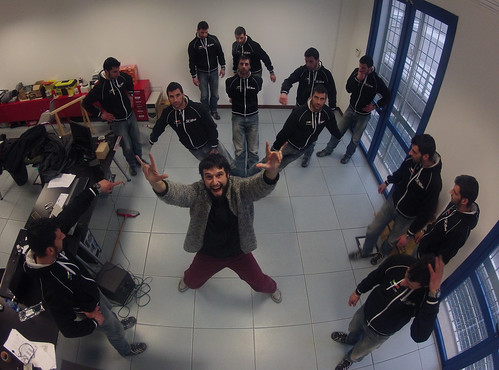My views on the database market for charities and NFPs: packages, CRM and bespoke developments. In particular, but not limited to, fundraising and membership.
Monday, September 29, 2014
Beware fake implementation timescales
This is a brief message: if you have been asked to plan a new CRM or fundraising database implementation, and you have been told to create a timescale for the project, then beware of the 'fake timescales' syndrome.
For example, if someone in your organisation (usually a senior manager…) says it must be done by date x, if there is no solid business reason for that date then don't just accept it. If you have over-run your procurement by a couple of months, then don't simply reduce the implementation time by 2 months - why has it suddenly become quicker to do just because you're starting later?! Or if your timeline is based on the fact that someone once did a project somewhere else in that timescale...
Of course, if you have an absolute deadline for a good reason then that needs to be accounted for, although even those can sometimes not be definite. e.g. if you are moving office, then is there no way you can continue to access your old database in your new office - or is that just an excuse to get a deadline? If your current software supplier is stopping the support of your current database on date x, then maybe you can accept the risk of still using it for just a short-time after that rather than rush your new implementation?
What you should do is work with your supplier and your project team, your key staff and your organisation's whole calendar, and work out how many months the implementation should take regardless of when you are starting. (Then review it again and see if even that is realistic…) Then you can allow for any periods which might mean it could take longer (e.g. Christmas/New Year, your big annual event, August holidays) and extend if it necessary. And if that really, really is unacceptable to your project board then you will need to explain you will have to de-scope something and/or increase resources.
But don't accept fake timescales - they don't do anything except increase the risk of failure.
Monday, September 22, 2014
During a procurement process, make sure you meet staff you will be working with if you select that supplier
Many people probably know the importance of this tip, but if not then you should do: when you are running a procurement process and you are meeting potential suppliers for your new CRM or fundraising system, make sure you meet the actual people from each supplier who will be working on your project. You need to be sure they are appropriate for your organisation and your project and you need to be sure that a supplier will not roll out their 'A team' during a sales presentation and then bring an entirely new team if they win the contract.
Getting the right people from the right supplier is a critical part of any procurement and subsequent implementation. You can meet the most charming and knowledgeable salesperson and pre-sales staff and then find that the implementation team know next to nothing and have no empathy with you. (Conversely, even if you don't like a salesperson, if their project team are good people then you might well overlook the dodgy salesman!)
So ask the supplier about who you could be working with, their skills and backgrounds, what other charity/fundraising/CRM projects have they worked on, why are they good, how are they trained, what is their knowledge of fundraising (or membership or service delivery…) Get their cv's. And meet them.
My one caveat to all this is that you need to do all this at the right moment during your procurement process. There is less point in doing it when you are still half a year ahead of a project kick-off - who knows what will happen between now and then; and it may be less fair to ask a company who is still on a short-list of six or seven possible suppliers for your project to name the definite people you will be working with. A supplier can't necessarily make such commitments at that time. That said, even in those scenarios you can (should) ask to meet the staff you might be working with and even that will give you an idea of the sort of person which the supplier employs - and then once you are down to your final few companies then you can start to be more firm with the suppliers and ask them for actual names and meet them.
Monday, September 15, 2014
When buying CRM systems, do consider multiple business partners for each platform
One of the great benefits of the generic CRM systems (Salesforce, Dynamics, CiviCRM etc) is that there are many business partners for all of them (aka resellers) who could help you implement such systems. But if you are considering such solutions during your procurement and you just have one supplier per platform pitch for your project (e.g. just one Salesforce reseller, one Dynamics reseller etc) then you will be missing out on all sort of possibilities.
For a start, each partner/company of course has their own approach to implementing such software for charities. And if you find that their approach, ethos or people are just not right for your organisation then you could be automatically eliminating 'their' platform but based more on the company than the software/solution. And that might be reducing your options in the wrong way. (Of course, it is quite understandable that you don't select a company because they aren't right for you, but I would suggest you should give yourself scope to understand alternatives apart from said company for said platform).
Then there is their knowledge, skills, background, experience and so on. And their beliefs and ideas as to how best to do such implementations. If you don't look at multiple suppliers for each CRM system then you will only see that system through the eyes of one company, and I think that presents quite a risk for you in not necessarily seeing the best of it - or conversely, understanding its weaknesses.
What if you have a business critical requirement such as processing direct debits or managing online event applications and you hear from just the one supplier that this can't be done on 'their' platform - then should that mean immediately that you can't use that system at all? Or as bad, what if you only select one supplier and they tell you they can easily do that function and then two-thirds down the line it turns out that they can't, then have you wasted an opportunity in understanding that platform better?
Even if you only review two such suppliers for each platform then you will learn so much more from each one, and thereafter even if there is one who you definitely don't want then it is still quite feasible you will learn something from them which you can use with the other business partner. (And even if you don't, then even that will tell you something as to how good and how much more appropriate your chosen partner is!) And remember, as per my recent blog post, you can also consider Pre-Qualifying meetings before short-listing to a final one or two suppliers per system, thus enabling the potential for even more comparisons.
Monday, September 01, 2014
Try Pre-Tender Qualifying Meetings with Suppliers
One long standing question with every CRM procurement process is, Who should we invite to tender for our project? You might well know some companies who you want to invite, but there may well be others you have heard about, researched or you are interested enough in them that you want to know more - but (probably) the last thing you want to do is to invite ten or twelve different suppliers to do long software presentations and answer even a medium length ITT document. Apart from anything, if you tell a supplier that they are one of twelve you are inviting to tender, then they aren't going to be nearly as driven to commit time and effort to your project as opposed to when they are one of four or five.
One option is therefore to hold 'pre-tender qualifying' meetings. (It's a bit similar to OJEU PQQs). For this, you will still need to meet at least those suppliers who you are uncertain about (and maybe even all possible suppliers - c.f. below) but only for a shorter time and with a slightly different brief. Bearing in mind the importance of the supplier themselves, their knowledge, skills, client-base, project approach and so on, you will gain an awful lot in these meetings just by discussing these sort of things with the suppliers even for just a couple of hours each. That's enough to give you a better understanding of them and for them to feel they are being listened to, but they don't have to spend many hours preparing for a detailed presentation or answering a long ITT - and you don't have to sit/wade through such presentations/documents.
And for anyone who doesn't think that this is long enough to assess a supplier's capabilities - well, I really can say that those who don't cut the mustard are fairly evident. In fact, I'm quite surprised at how poor (sadly) some prospective suppliers can be. You'll know them when you see them. And it's not just me who has found that out - the clients I work with are just as savvy at picking up on the poorer candidates. Okay, every now and then we might see a company who initially impress us and then we later find out they aren't quite all they were quite cracked up to be, but that's comparatively rare and that is part of the procurement process.
I do sometimes also ask suppliers to give me a brief demo of their software in such meetings, but I do so mostly where I already have some idea of that software - e.g. especially with the generic CRM systems. It isn't fair to a supplier to ask them to give you a thorough demo for the first time in just 30-45 minutes, it's almost not worth it. But if you know the basics of, say, Salesforce or Dynamics, and you instead want to see how a supplier has configured it for another charity or type of fundraising, then that can help.
I also always ask suppliers to bring at least one of their project team who our charity could be working with to these meetings. So it's not just the salesperson you are meeting, but, also say, a project manager, implementation consultant, technical architect, support manager etc. The suppliers who value your business will do so. Those who do only bring a salesperson will tell you something about the company too.
After all these meetings, you can then short-list to, say, between three and five companies (or whatever number you are comfortable with), in order to get right down to detail.
I find this process especially useful these days with the sheer number of possible "CRM" suppliers (i.e. the Salesforce, Dynamics, CiviCRM partners etc) where, even though they are using the same platform, there can still be distinct differences in a supplier's approach, knowledge or how they use the software. But it is equally useful with the fundraising package vendors too.
In terms of fairness, if I am holding such meetings, I would do this not just with those suppliers who I may or may not ultimately short-list, but even with those who I am pretty sure I will short-list anyway. That means you can judge everyone equally, give everyone the same possibility to impress (or otherwise) and you are bound to learn something at this stage about everyone, whoever they are.
Subscribe to:
Comments (Atom)



